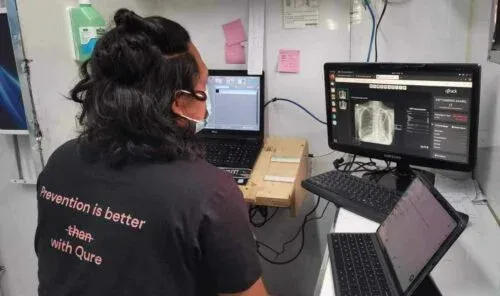The Philippines has long been at the forefront of the fight against tuberculosis (TB), with the Philippine Business for Social Progress (PBSP) playing a key role in TB control management for over two decades. The Advancing Client-centered Care and Expanding Sustainable Services for TB (ACCESS TB) project, funded by The Global Fund to Fight Aids, Tuberculosis, and Malaria, aims to further reduce TB prevalence, incidence, and mortality by providing comprehensive quality TB care to Filipinos.
Back
A crucial component of the ACCESS TB project was the deployment of mobile vans equipped with X-ray machines and AI-enabled software for the interpretation of chest radiographs. These vans, manned by trained radiographers and health workers, were intended to screen presumptive TB cases and individuals with high-risk factors by running them across different cities in the Philippines.
The ACCESS TB project has gone beyond just screening and diagnosis. It has also provided diagnostics and treatment services for both drug-susceptible and multidrug-resistant TB (MDR-TB) cases, expanding access to hundreds of MDR-TB diagnostic and treatment centers. The project has also engaged thousands of private doctors, trained thousands of healthcare providers, and cured thousands of patients through its comprehensive approach.
When the COVID-19 pandemic hit the Philippines, the National TB Control Program (NTP) had to act quickly to ensure that TB patients continued to access their lifesaving treatment. The ACCESS TB project, along with the NTP, WHO, USAID, and other partners, developed the National TB Adaptive Plan to maintain TB prevention, testing, and treatment even during the lockdowns.
One of the key innovations was the implementation of home-based treatment for drug-resistant TB (DR-TB) patients. Prior to COVID-19, these patients had to report to a facility every day to take their medications, leading to a high rate of loss to follow-up. With the adaptive plan, patients were allowed to take a month's worth of medications home, and healthcare workers conducted regular home visits to monitor their progress and collect sputum samples for laboratory follow-ups.
This shift to home-based treatment had a significant impact, reducing the loss to follow-up rate from 16% before COVID-19 to only 4% in 2020. The pandemic has accelerated the adoption of these patient-centric measures, which have proven to be effective in improving treatment adherence and outcomes.
The ACCESS TB project also expanded the role of its Specimen Transport Riders (STRiders) – motorcycle riders who not only transport sputum specimens to laboratories but also deliver medications from facilities to patients' homes. This integrated service has benefited both TB and HIV programs.
With the support of the Global Fund's COVID-19 Response Mechanism (C19RM) funding, the ACCESS TB project is now scaling up digital adherence tools, such as video observed therapy (VOT) and digital pill boxes, to further enhance patient support and monitoring. Additionally, the project is expanding the reach of mobile clinics that can perform on-site TB testing and screening, including at COVID-19 testing and vaccination sites, to ensure that no one is left behind in the fight against TB.
The Philippines' proactive response and the collaborative efforts of the NTP, PBSP, and their partners have demonstrated the resilience and adaptability of the country's TB control program in the face of the COVID-19 pandemic. By prioritizing patient-centered care and leveraging innovative technologies, the ACCESS TB project is making significant strides in improving TB outcomes and paving the way for a healthier future for the Filipino people.
